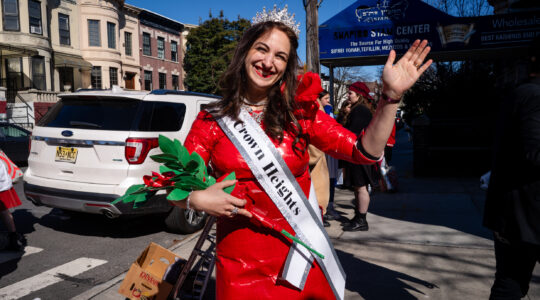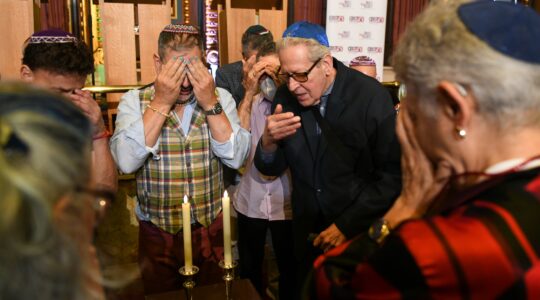Albert Einstein’s combination of scientific genius, humility, good humor and distinctive grooming made him a cultural icon. An illuminating exhibition at the American Museum of Natural History provides remarkably lucid explanations of the shock-headed scientist’s theories that changed the way light, time, energy and gravity are understood.
“Einstein” also demonstrates how the Nobel Prize-winning physicist used his celebrity to promote his other passionate concerns: pacifism, socialism, disarmament and Zionism.
These days, Zionism seldom appears alongside liberal causes. But in “Einstein” — organized by the AMNH, Hebrew University of Jerusalem and the Skirball Center, Los Angeles — the Jewish claim to a homeland in the Middle East is presented as consistent with a worldview that embraces universal human rights.
A section describing Einstein’s anti-war activities and his advocacy for civil rights in America also details his visit to Palestine in 1923, his enduring support of the establishment of Hebrew University (founded in 1925) and his participation in the Zionist movement.
“I can envision the Palestine of the future only as the scene of peaceful cooperation between the two peoples whose homeland it is,” Einstein wrote in a December 1929 letter to the editor of the Palestinian-Arab newspaper Falastin. The letter is displayed in a case with a 1952 missive from the Israeli ambassador to the United States, Abba Eban, offering Einstein the presidency of Israel. (Einstein declined.)
The German-born, self-proclaimed “global citizen” envisioned Israel as a spiritual and cultural center rather than a political entity, but he saw its creation as a necessity nonetheless.
In a 1938 issue of Collier’s magazine, Einstein answered the question “Why do they hate the Jews?” in a three-page essay that stated, in part, “because [Jews] are always too thinly scattered to defend themselves against attack.”
Naturally, the centerpiece of “Einstein” is a group of exhibits that clearly explains his revolutionary discoveries. Of the dozens of remarkable documents on display, visitors to the exhibition can pore over handwritten pages of a 1912 manuscript expanding on his 1905 Special Theory of Relativity — one can make out E=mc2 among other equations.
The exhibition, on view through Aug. 10, further reveals Einstein (1879-1955) to be a dedicated activist — and a ladies’ man. But his connection to the Jewish people gets equal treatment. His recognizable, accented voice is heard only twice, in an introductory film: he jokes in German with a news reporter and, in English, speaks out on behalf of Jewish refugees from Nazi persecution.
A “deeply religious nonbeliever,” Einstein identified strongly with Jewish tradition, describing it as “the pursuit of knowledge for its own sake, an almost fanatical love of justice, and the desire for personal independence.” These features, he once said, “make me thank my lucky stars I belong to it.”
The New York Jewish Week brings you the stories behind the headlines, keeping you connected to Jewish life in New York. Help sustain the reporting you trust by donating today.




